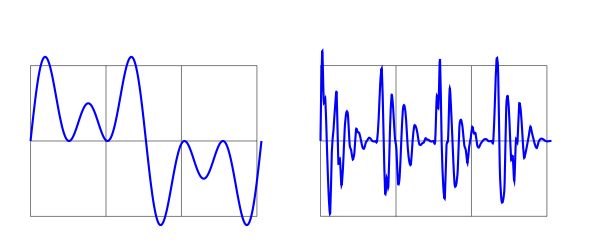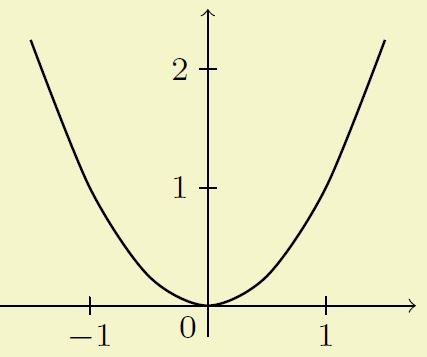PGF and TIkz里面自定义函数的例子
PGF and TIkz里面自定义函数的例子:
\documentclass{beamer}
\input{tikzall.tex} %包含所有的tikz包
\begin{document}
\begin{frame}
%第一种定义方法
\begin{tikzpicture}
\draw [help lines] (0,0) grid (3,2);
\draw [blue, thick, x=0.0085cm, y=1cm,
declare function={
sines(\t,\a,\b)=1 + 0.5*(sin(\t)+sin(\t*\a)+sin(\t*\b));
}]
plot [domain=0:360, samples=144, smooth] (\x,{sines(\x,3,5)});
\end{tikzpicture}
\end{frame}
\begin{frame}
%第二种定义方法
\begin{tikzpicture}[
declare function={
excitation(\t,\w) = sin(\t*\w);
noise = rnd - 0.5;
source(\t) = excitation(\t,20) + noise;
filter(\t) = 1 - abs(sin(mod(\t, 90)));
speech(\t) = 1 + source(\t)*filter(\t);
}
]
\draw [help lines] (0,0) grid (3,2);
\draw [blue, thick, x=0.0085cm, y=1cm] (0,1) --plot [domain=0:360, samples=144, smooth] (\x,{speech(\x)});
\end{tikzpicture}
\end{frame}
\end{document} rnd是生成一个随机数的函数.:
declare function后面定义的函数,可以立即使用前面定义的函数.
效果如图所示:
还有使用datavisualization 绘制函数也是很好的一种方法:
\begin{tikzpicture}
\datavisualization [school book axes, visualize as smooth line]
data [format=function] {
var x : interval [-1.5:1.5] samples 7;
func y = \value x*\value x;
};
\end{tikzpicture}效果如下:

